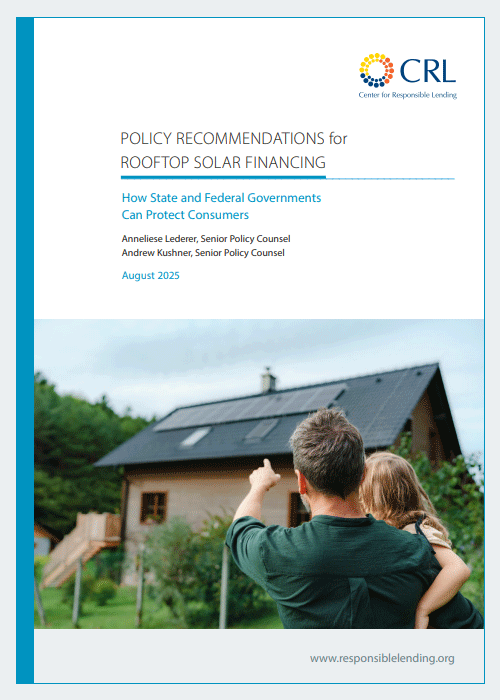
To continue being a global economic leader, the United States needs access to reliable and robust energy sources. Without reliable and diverse sources of energy, the likelihood of a national security incident or a detrimental adverse economic event increases. One energy option that must be part of the mix is solar energy, which is captured both in large, utility-scale solar farms and through solar panels placed on the roofs of homes and businesses across the country.
Solar and other renewable energy sources can provide numerous benefits to homeowners, renters, and the nation, including lower utility bills, energy price stability, enhanced energy grid resilience, and reduced reliance on foreign sources of energy. Many homeowners who decide to get a solar rooftop system will finance it. Unfortunately, as documented in a Center for Responsible Lending (CRL) white paper, some solar lenders and solar sales companies engage in multiple harmful or illegal practices. Solar system purchasers are at risk because of these practices, which include false representations about the system's benefits and financing costs and terms, improper installation and connection of the system, failure to comply with consumer legal protections, and the use of contract clauses that block consumer redress for any of these acts. These problems may sometimes result in systems that do not produce sufficient savings to offset the costly monthly payments for the system.
Improving consumer protection in this area has been one of the most pressing topics at statehouses across the country during the 2025 legislative session. Bills to improve protections for solar customers were introduced in California, Connecticut, Massachusetts, New Mexico, New York, and Oregon, and such bills ultimately passed the legislature in Colorado, Montana, Nevada, Texas, and Utah. The most comprehensive of these bills is the legislation currently pending in California, which addresses, among other issues, the significant problems of hidden “dealer fees” and panels that are installed but not functioning.
CRL continues to believe that both policymakers and regulators must protect solar finance consumers and legitimate solar and solar finance companies by enacting policies that create a safer, more transparent market. While this paper addresses recommendations for both state and federal policymakers and regulators, the current federal climate means that the states must take the lead on these issues in the near term. This paper’s core recommendations for state regulators, which are described in greater detail below, are:
- States should require a specific "ability to repay" analysis for solar loans and limit the hidden upfront fees, known as "dealer fees," that lenders often pass on to unsuspecting borrowers.
- States should enact rules specifically governing the representations that solar salespersons make to borrowers so that borrowers are not misled into agreeing to a solar system that costs more than and does not produce as much energy as promised.